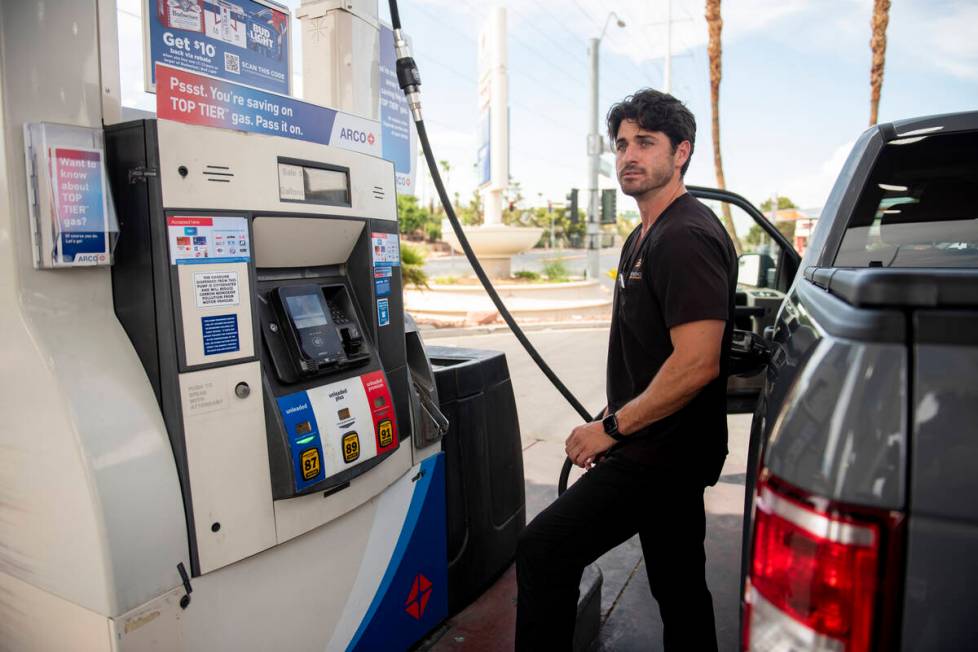Nevada’s gas prices could soon skyrocket. Blame it on a new California law

Gas prices in Nevada could rise because of a new law California put in place to curb price gouging.
Last year the Golden State created a new state division via legislation, known as the California Gas Price Gouging and Transparency Law, to oversee and regulate the state’s gas and fuel operations. The law also paved the way for the California Energy Commission to set a maximum margin for oil/gasoline refineries and penalize refiners that exceed the margin.
Gov. Joe Lombardo and others are concerned that setting maximum margins or profits on California’s refineries could limit the amount of gasoline the state exports and increase gas prices in the West as many states — including Nevada — get gas from California refineries.
It’s unknown what the exact impact of the California law will be, as state regulators are still considering how and if they should put profit caps on refiners but one analyst said gas prices could go up to as high as $10 per gallon in Nevada if extreme measures are put in place. A decision on profit caps is expected to be issued later this year, a CEC spokesperson said.
Whatever the decision is, it will greatly impact Nevada since the state gets about 88 percent of its fuel from California refineries, Lombardo said in a May letter to California Gov. Gavin Newsom.
“We’re stuck with what happens in California,” said Peter Krueger, state director for the Nevada Petroleum Marketers and Convenience Store Association, which represents fuel distributors and retailers.
Impact on Nevada gas prices
Even though no decision has been made, if California moves forward to create a profit cap it would likely cut down the supply of gas in the Western U.S. and lead to an increase in prices, said Patrick De Haan, head petroleum analyst for GasBuddy.com.
“The potential impact could be severe enough where either (Nevada is) not getting gasoline, or the gasoline that does flow into Nevada could be theoretically $5 or $10 a gallon,” De Haan said. “The degree of how high prices go, is dependent on how much they tighten the market.”
Krueger said he wouldn’t know the impact on prices at the pump but said Nevada has few alternatives since the state’s biggest fuel pipelines are connected to California and it doesn’t make sense for Nevada to get its gas delivered by trucks from other states.
“We’re very limited in where we can go,” he said. “ If it’s based only on price, then we’re going to have to suck it up and pay the price that it’s delivered to us at.”
California and Nevada already have some of the highest gas prices in the nation. On Thursday, California had the highest average gas price in the U.S. at $4.87 per gallon, while Nevada had the fifth highest at $4.05, according to AAA data.
Governors go back and forth
Lombardo’s letter to Newsom also expressed concerns that California’s price gouging laws could raise gas prices.
“While we have no details on what this might look like, I’m concerned that this approach could lead to refiners either constraining supplies of fuels to avoid a profit penalty or even leaving our shared fuels market entirely,” Lombardo said in his letter. “Either scenario would likely lead to limited supplies and higher fuel costs for consumers in both of our states.”
Lombardo asked that before any profit caps are put in place California looks at what the impacts of the caps would have on gas prices across the West.
Newsom hasn’t been receptive to Lombardo’s letter.
“This is a stunt to appease Gov. Lombardo’s Big Oil donors, who contributed tens of thousands of dollars to his campaign,” a spokesperson for Newsom said, in an emailed statement to the Las Vegas Review-Journal. “He’s parroting their talking points, and he knows full well that oil refiners are driving up gas prices and making massive profits — harming residents of both of our states. Price spikes are profit spikes, and California is holding Big Oil accountable.”
Lombardo’s office said in a statement to the Las Vegas Review-Journal that the governor was expressing “good faith” concerns on the impact of California’s new laws.
“Political gamesmanship isn’t the answer to legitimate policy concerns, and Governor Lombardo’s offer to have the Nevada Office of Energy assist the California Energy Commission in understanding the impacts of their policy decisions still stands — though Governor Newsom has no apparent interest in that,” said Elizabeth Ray, a spokesperson for Lombardo, in an emailed statement.
What can Nevada do?
De Haan said that the impacts on any decisions around refinery profit caps will likely take several years to be felt but will likely end in prices going up.
“The long run game of this is, if you disincentivize refineries from refining, you’re going to end up with lower supply,” he said.
While the decision on price caps is still on the way there isn’t much Nevadans can do but monitor the process, De Haan said.
It’s unlikely Nevada could become less reliant on California refineries unless more refineries are constructed in the Silver State but that could be challenging since the state is landlocked, De Haan said.
Krueger said building refiniers in Nevada is a “non-starter” since the state has no pipelines to import crude oil.
Ray said the Nevada Office of Energy has been directed to have policy discussions on refinery profit caps with interested parties both in Nevada and the region.
Contact Sean Hemmersmeier at shemmersmeier@reviewjournal.com. Follow @seanhemmers34 on X.